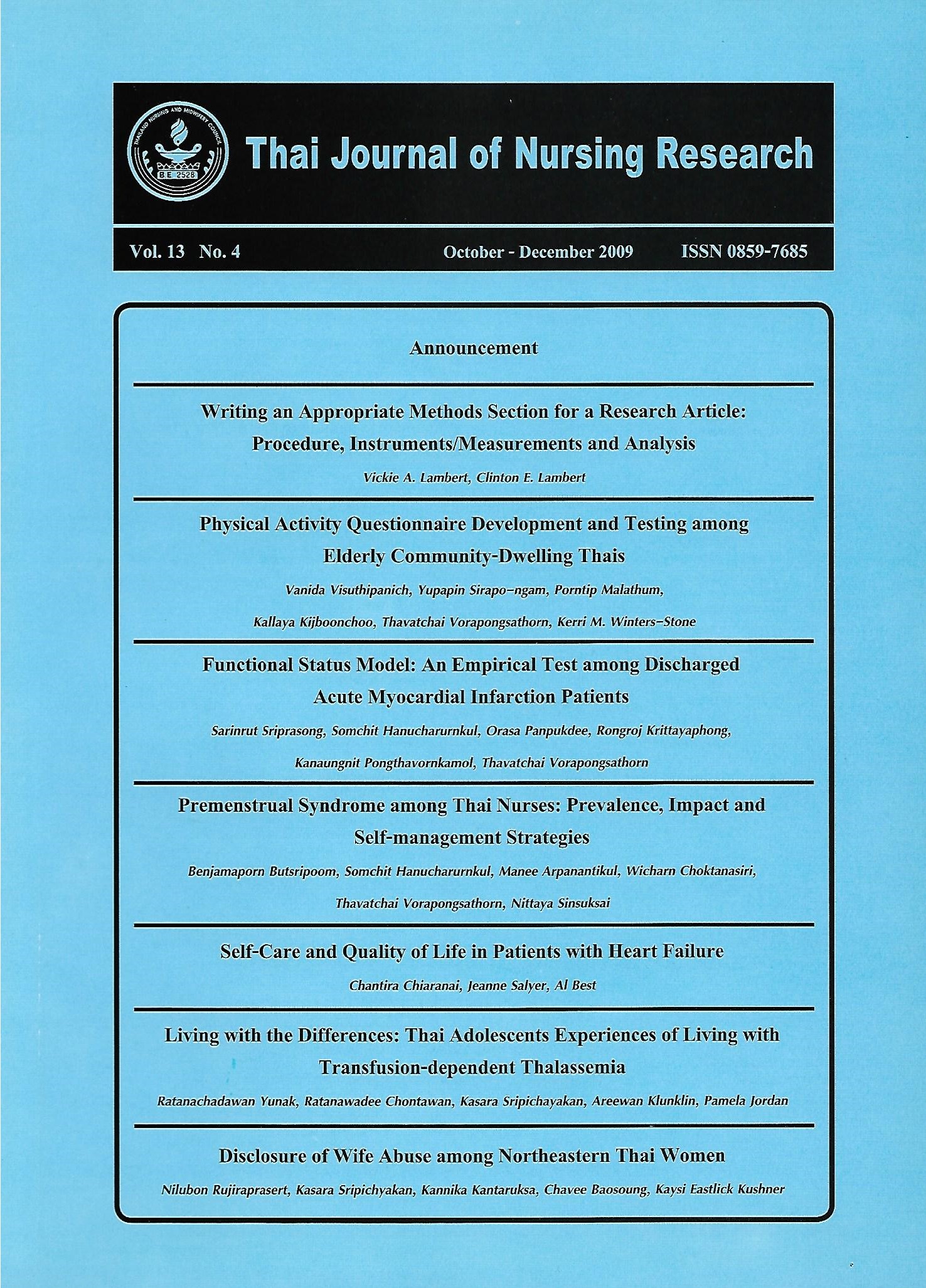Self-Care and Quality of Life in Patients with Heart Failure
Keywords:
การดูแลตนเอง, คุณภาพชีวิต, หัวใจล้มเหลว, self-care, quality of life, heart failureAbstract
บทคัดย่อ
การดูแลตนเองเป็นสิ่งท้าทายความสามารถของผู้ป่วยหัวใจล้มเหลว แม้ว่าสามารถทำนายได้ว่าผู้ป่วยที่มีความสามารถในการดูแลตนเองที่ดี จะมีคุณภาพชีวิตที่ดี อย่างไรก็ตามงานวิจัยที่สนับสนุนข้อสรุปนี้มีอยู่จำกัด จึงควรมีการทำวิจัยเพิ่มเติมเพื่อยืนยันข้อสรุปดังกล่าว ดังนั้น การวิจัยนี้มีวัตถุประสงค์ เพื่อศึกษาความสัมพันธ์ระหว่างความสามารถในการดูแลตนเองและคุณภาพชีวิตของผู้ป่วยหัวใจล้มเหลว ตลอดจนศึกษาอำนาจทำนายคุณภาพชีวิตของผู้ป่วยหัวใจล้มเหลว กลุ่มตัวอย่างในการวิจัยแบบพรรณา ครั้งนี้มีจำนวน 98 คน การคัดเลือกกลุ่มตัวอย่างเป็นการเลือกแบบเฉพาะเจาะจง จากผู้ป่วยหัวใจล้มเหลวที่มาติดตามการรักษาที่ คลินิกหัวใจล้มเหลว ณ Virginia Commonwealth University Health System เก็บรวบรวมข้อมูลโดยใช้การ ส่งแบบสอบถามทางไปรษณีย์ แบบสอบถาม ประกอบด้วย แบบบันทึกข้อมูลทั่วไป, Charlson Co-morbidity Index, Medical Outcomes Study Social Support Survey, Self-Care of Heart Failure Index, Short-Form-12 Health Survey, และMinnesota of Living with Heart Failure Questionnaire ผลการวิจัยพบว่า 1) self-care management, self-care self-confidence, สมรรถภาพการทำงานของหัวใจที่ดี และจำนวนโรคประจำตัวน้อย ทำนายคุณภาพชีวิตที่ดีของผู้ป่วยหัวใจล้มเหลว 2) สมรรถภาพการทำงานของหัวใจ, self-care maintenance, self-care self-confidence, และ self-care management ทำนายคุณภาพชีวิตด้านร่างกายที่ดีของผู้ป่วยหัวใจล้มเหลว 3) สมรรถภาพการทำงานของหัวใจ และเพศชาย ทำนายคุณภาพชีวิตด้านจิตสังคมที่ดีของผู้ป่วยหัวใจล้มเหลว
คำสำคัญ: การดูแลตนเอง, คุณภาพชีวิต, หัวใจล้มเหลว
Abstract
Self-care for those with heart failure (HF) is challenging. Despite predictions that better self-care can positively influence quality of life (QOL), there is a lack of evidence supporting this assumption. Further investigation may help identify those vulnerable to a diminished QOL, due to an inability to incorporate selfcare in management of their HF. Therefore, this study aimed to describe the self-care process (e.g., self-care maintenance and self-care management) and examine relationships among demographic characteristics, social support, self-care processes, self-care self-confidence and QOL. In addition, demographic and clinical characteristics, as well as social support, were evaluated for their effects on QOL (disease-specific, physical functioning and mental-emotional functioning). The sample (n=98), for this cross-sectional cohort study, was recruited from the HF/Transplant Program at Virginia Commonwealth University Health System. Subjects were asked to complete six mailed survey questionnaires including a: 1) Demographic Questionnaire; 2) Charlson Co-morbidity Index; 3) Medical Outcomes Study (MOS) Social Support Survey; 4) Self-Care of HF Index; 5) MOS Short-Form-12 Health Survey; and, 6) Living with HF Questionnaire.
The results revealed: 1) better disease-specific QOL was predicted by being less likely to require self-care management strategies, better self-care self-confidence, lower NYHA functional class and less comorbidity; 2) better physical functioning QOL was predicted by lower NYHA functional class, better self-care maintenance, better self-care self-confidence and being less likely to require self-care management strategies; and, 3) better mental-emotional functioning QOL was predicted by lower NYHA functional class and being male.
Keywords: self-care, quality of life, heart failure
Downloads
How to Cite
Issue
Section
License
Copyright: The Pacific Rim International Journal of Nursing Research, Thailand Nursing & Midwifery Council has exclusive rights to publish, reproduce and distribute the manuscript and all contents therein.








.png)



